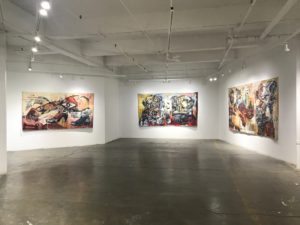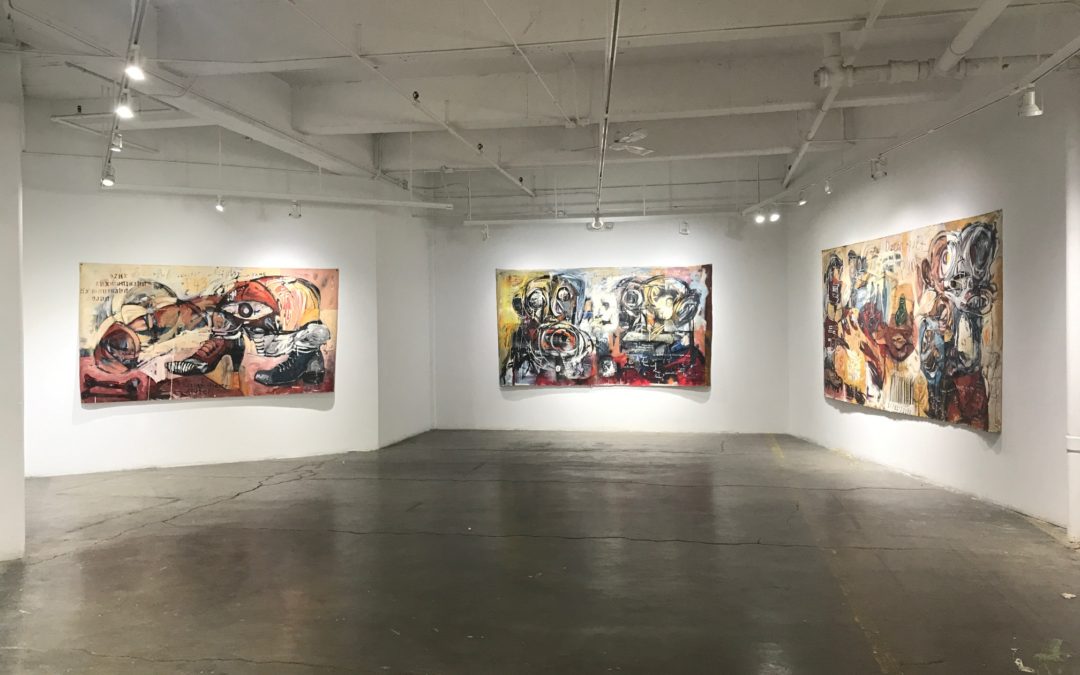George Hughes, “The Politics of Identity” at Buffalo Arts Studio by Julia Bottoms

George Afedzi Hughes’ paintings are coded maps. Each detail carrying the weight of direction; of intentionality. When gazing upon them, it seems as though he has a very specific destination in mind, but it is left up to the viewer to discern where each winding path should lead. He appears to be slightly less concerned with the final destination as he is with the journey in and of itself. One might even say the paintings have an inconclusive final resting point, as though at any moment, a robotic voice might announce “rerouting! rerouting!” and alert us that the definitive “end” has yet to be reached. Looking at the political nature of Afedzi Hughes’ work, the previous metaphor becomes quite clear. He addresses non-linear themes such as identity, the far reaching effects of colonialism, and the reconciliation of the former in the reality of the latter. Afedzi Hughes’ confronts these themes on a personal level in his older work, as well as a broader level in his more recent pieces. But the one singular element that carries through all of it is this sense of visual mapping.
Born in Ghana, and educated/ recognized internationally, Afedzi Hughes’ work reflects a well rounded and worldly take on the subject matter. His older pieces are much looser. The colors are deep, dominated by reds and earth tones. They feel quite heavy and deeply personal. There are even family photos interwoven into the work. And yet we find clues that the pieces transcend mere personal history, and rather, attempt to find one’s place within a larger structure. Looking at a work such as Red Coat Stigmata, we find charged symbols such as bar codes and dollar signs jumping out at the viewer, providing a visual anchor in what could otherwise read as an overwhelming amount of information. One can only imagine that the frantic flurry of elements on display, in part reflects the similar inner dilemma of exploring one’s place in a world very much shaped by the wounds of colonialism.
Afedzi Hughes’ newer work is located in a separate adjoining room of the gallery; a well executed curatorial decision. Upon turning the corner it becomes clear that this is a very different body of work. Equally powerful to the first, but with an entirely different approach. If Afedzi Hughes’ older work was a snapshot of personal identity, then this more recent series is him holding up a mirror to global conflict. The work does retain a certain surreal and removed quality, similar to that of the older work. Part of this is due to his compositional choices as an artist, while part of it stems from the topic at hand. The topic Afedzi Hughes’ is addressing is somewhat literally foreign to us here in the United States in practice, but also very familiar in its racist intent. Recurring symbols in this new body of work are bananas and soccer balls. This is in reference to the European practice of racist audience members throwing bananas onto the field when a black athlete is performing. “This exhibition is very timely. We were installing this work the week after the president made racist remarks about Africa and those who come to the United States from there. In his most recent work, Hughes is addressing this type of racism through the metaphor of the sports arena, but the connection to the political arena is also clear” says Buffalo Arts Studio curator Shirley Verrico.
Afedzi Hughes’ tackles this subject matter as well as the commoditization of black athletes bodies and talent, with finesse. The paintings almost feel playful with their spring-like palette and occasional gold elements in works such as After Party. Perhaps this is part of Afedzi Hughes’ intention; to lead our mind into a headspace of play, only to abruptly confront us with the social reality at hand upon examination of his included symbols. The audience is left to reflect upon the notion that colonialism is not limited to bodies of land, but may also include the literal acquisition, control, and exploitation of a human body as well.

